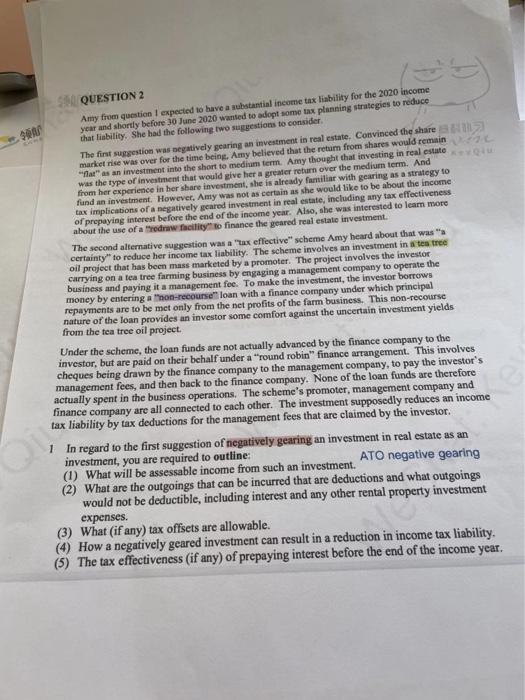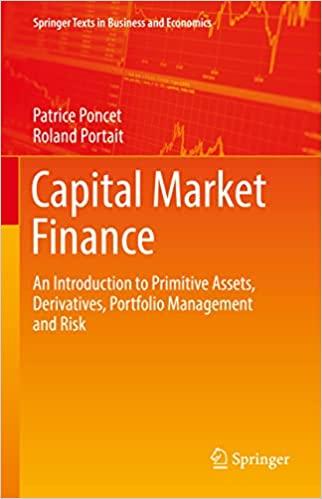QUESTION 2 Amy from question I expected to have a substantial income tax liability for the 2020 income year and shortly before 30 June 2020 wanted to adopt some tax planning strategies to reduce that liability. She had the following two suggestions to consider. The first suggestion was negatively gearing an investment in real estate. Convinced the share market rise was over for the time being, Amy believed that the return from shares would remain "flat" as an investment into the short to medium term. Amy thought that investing in real estate was the type of investment that would give her a greater return over the medium term. And from her experience in her share investment, she is already familiar with gearing as a strategy to fund an investment. However, Amy was not as certain as she would like to be about the income tax implications of a negatively geared investment in real estate, including any tax effectiveness of prepaying interest before the end of the income year. Also, she was interested to learn more about the use of a "redraw facility" to finance the geared real estate investment. The second alternative suggestion was a "tax effective" scheme Amy heard about that was "a certainty" to reduce her income tax liability. The scheme involves an investment in a tea tree oil project that has been mass marketed by a promoter. The project involves the investor carrying on a tea tree farming business by engaging a management company to operate the business and paying it a management fee. To make the investment, the investor borrows money by entering a "non-recourse" loan with a finance company under which principal repayments are to be met only from the net profits of the farm business. This non-recourse nature of the loan provides an investor some comfort against the uncertain investment yields. from the tea tree oil project. Under the scheme, the loan funds are not actually advanced by the finance company to the investor, but are paid on their behalf under a "round robin" finance arrangement. This involves cheques being drawn by the finance company to the management company, to pay the investor's management fees, and then back to the finance company. None of the loan funds are therefore actually spent in the business operations. The scheme's promoter, management company and finance company are all connected to each other. The investment supposedly reduces an income tax liability by tax deductions for the management fees that are claimed by the investor. 1 In regard to the first suggestion of negatively gearing an investment in real estate as an investment, you are required to outline: ATO negative gearing (1) What will be assessable income from such an investment. (2) What are the outgoings that can be incurred that are deductions and what outgoings would not be deductible, including interest and any other rental property investment expenses. (3) What (if any) tax offsets are allowable. (4) How a negatively geared investment can result in a reduction in income tax liability. (5) The tax effectiveness (if any) of prepaying interest before the end of the income year. QUESTION 2 Amy from question I expected to have a substantial income tax liability for the 2020 income year and shortly before 30 June 2020 wanted to adopt some tax planning strategies to reduce that liability. She had the following two suggestions to consider. The first suggestion was negatively gearing an investment in real estate. Convinced the share market rise was over for the time being, Amy believed that the return from shares would remain "flat" as an investment into the short to medium term. Amy thought that investing in real estate was the type of investment that would give her a greater return over the medium term. And from her experience in her share investment, she is already familiar with gearing as a strategy to fund an investment. However, Amy was not as certain as she would like to be about the income tax implications of a negatively geared investment in real estate, including any tax effectiveness of prepaying interest before the end of the income year. Also, she was interested to learn more about the use of a "redraw facility" to finance the geared real estate investment. The second alternative suggestion was a "tax effective" scheme Amy heard about that was "a certainty" to reduce her income tax liability. The scheme involves an investment in a tea tree oil project that has been mass marketed by a promoter. The project involves the investor carrying on a tea tree farming business by engaging a management company to operate the business and paying it a management fee. To make the investment, the investor borrows money by entering a "non-recourse" loan with a finance company under which principal repayments are to be met only from the net profits of the farm business. This non-recourse nature of the loan provides an investor some comfort against the uncertain investment yields. from the tea tree oil project. Under the scheme, the loan funds are not actually advanced by the finance company to the investor, but are paid on their behalf under a "round robin" finance arrangement. This involves cheques being drawn by the finance company to the management company, to pay the investor's management fees, and then back to the finance company. None of the loan funds are therefore actually spent in the business operations. The scheme's promoter, management company and finance company are all connected to each other. The investment supposedly reduces an income tax liability by tax deductions for the management fees that are claimed by the investor. 1 In regard to the first suggestion of negatively gearing an investment in real estate as an investment, you are required to outline: ATO negative gearing (1) What will be assessable income from such an investment. (2) What are the outgoings that can be incurred that are deductions and what outgoings would not be deductible, including interest and any other rental property investment expenses. (3) What (if any) tax offsets are allowable. (4) How a negatively geared investment can result in a reduction in income tax liability. (5) The tax effectiveness (if any) of prepaying interest before the end of the income year







